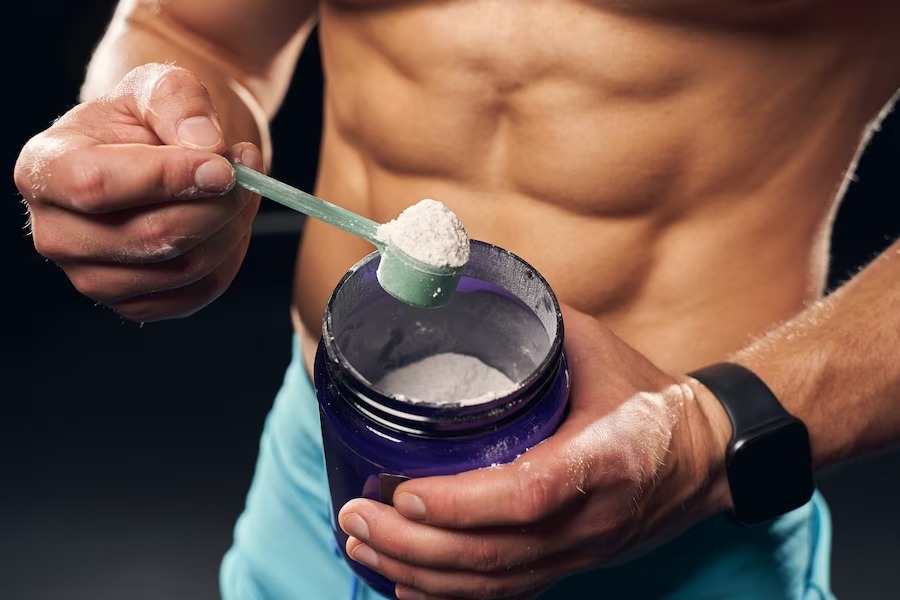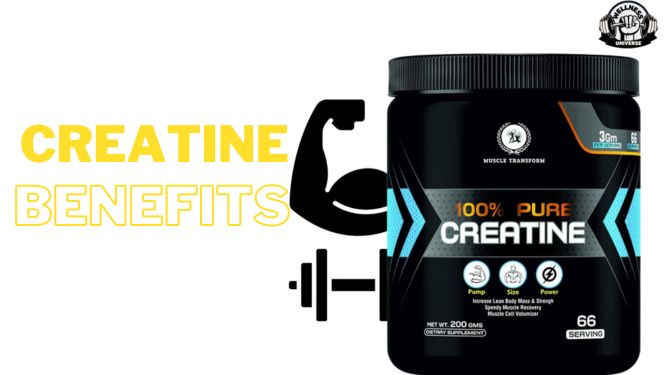Muscle Magic: The Art of Creatine Transformation

Creatine transformation refers to the process of using creatine as a supplement to enhance athletic performance, muscle growth, and overall body transformation. Creatine is a naturally occurring compound found in small amounts in certain foods and is also synthesized by the body. It plays a vital role in cellular energy production, particularly during high-intensity and short-duration activities, such as weightlifting, sprinting, and jumping.
When individuals engage in intense physical activities, the demand for energy increases. Creatine aids in the replenishment of adenosine triphosphate (ATP), the primary energy currency in cells, allowing muscles to perform at their peak and delay fatigue. As a result, creatine supplementation has gained popularity among athletes, fitness enthusiasts, and individuals seeking to maximize their training efforts and achieve body transformation goals.
The significance of creatine in the realm of fitness and body transformation cannot be overstated. It acts as an ergogenic aid, enhancing exercise performance and promoting adaptations that support muscle growth and strength gains. By increasing the availability of ATP, creatine enables individuals to push harder during workouts, leading to improved exercise capacity and more effective training sessions.
Moreover, creatine has been extensively researched, and numerous scientific studies have demonstrated its efficacy in improving muscle strength, power, and lean body mass. It is a valuable tool for athletes engaged in resistance training, high-intensity interval training, and other anaerobic activities.
Understanding Creatine Transformation
To comprehend creatine transformation, it is essential to understand the fundamental role of creatine in cellular energy production. Creatine is primarily stored in skeletal muscle tissue as phosphocreatine, a high-energy molecule. During high-intensity activities like weightlifting or sprinting, the body rapidly consumes adenosine triphosphate (ATP) for energy. As ATP is depleted, phosphocreatine steps in to replenish it, allowing muscles to sustain short bursts of intense effort.
Creatine’s ability to regenerate ATP makes it a crucial component of the anaerobic energy system. By supporting this energy recycling process, creatine enables individuals to perform at their best during short-duration, high-intensity exercises. This enhanced energy availability translates into increased strength, power, and overall exercise performance.
Beyond its role in energy production, creatine plays a pivotal role in supporting muscle growth and overall athletic performance. When muscles are subjected to resistance training or other forms of high-intensity exercise, they undergo microscopic damage. This damage triggers the body’s natural repair and rebuilding process, resulting in muscle hypertrophy (growth) over time.
Creatine contributes to muscle growth in several ways. Firstly, by enhancing energy availability during workouts, creatine allows individuals to lift heavier weights and perform more repetitions, leading to greater mechanical stress on the muscles. Secondly, creatine supplementation increases water content within muscle cells, creating a state of cellular hydration that supports protein synthesis and muscle volumization.
The efficacy of creatine in promoting muscle transformation has been extensively studied and well-documented. Numerous scientific studies and meta-analyses have consistently demonstrated the positive impact of creatine on muscle strength, power, and lean body mass.
Research has shown that creatine supplementation can lead to significant improvements in maximal strength, particularly in exercises like bench presses, squats, and deadlifts. Additionally, creatine has been found to enhance muscle power output during activities such as jumping and sprinting, making it beneficial for athletes in various sports.
Furthermore, studies have revealed that creatine supplementation is most effective in activities that involve short bursts of high-intensity effort, where the ATP-PCr energy system is primarily engaged.
Beyond the scientific evidence, real-life experiences and testimonials from athletes and fitness enthusiasts further attest to the effectiveness of creatine in muscle transformation. Many individuals have reported notable improvements in strength, muscle mass, and exercise performance after incorporating creatine into their training regimen.
Athletes in sports such as bodybuilding, powerlifting, and sprinting have credited creatine as a key component of their success. Moreover, recreational gym-goers and fitness enthusiasts have shared their personal stories of achieving impressive muscle gains and enhanced workout performance with creatine supplementation.
These real-life transformations and success stories underscore the potential of creatine as a valuable tool for individuals seeking to maximize their muscle growth and overall physical performance.
By understanding creatine’s role in cellular energy production, muscle growth support, and its extensive scientific backing, individuals can gain confidence in embracing creatine transformation as a safe and effective approach to optimizing their fitness journey. Additionally, the compelling real-life testimonials from users serve as inspiring examples of the transformative power of creatine for muscle development and athletic enhancement.
The Benefits of Using Creatine for Body Transformation
One of the primary benefits of using creatine for body transformation is its profound impact on muscle building and increased strength. As creatine enhances the body’s ability to generate ATP, it allows individuals to perform more intense workouts and push their muscles to new limits. This increased training capacity leads to greater mechanical stress on the muscles, which is a key stimulus for muscle hypertrophy.
Studies have consistently shown that creatine supplementation can significantly improve strength gains, particularly in exercises involving multiple muscle groups and high resistance. By enhancing muscular strength, creatine paves the way for more challenging workouts and accelerated muscle growth, making it an invaluable tool for individuals aiming to transform their physique.
Creatine’s ability to replenish ATP rapidly and support high-intensity efforts translates into enhanced athletic performance and exercise capacity. Whether it’s sprinting, jumping, or weightlifting, creatine provides athletes and fitness enthusiasts with the energy reserves needed to excel in short-duration, explosive activities.
For endurance athletes, creatine may also offer benefits in activities that require intermittent bursts of high-intensity effort, such as sprint cycling or interval running. The increased availability of energy during these activities can lead to improved overall performance and reduced fatigue.
Creatine’s impact on body transformation extends beyond the workout itself. Research suggests that creatine may play a role in reducing muscle damage and inflammation, promoting faster recovery between exercise sessions. By facilitating quicker recovery, individuals can engage in more frequent and intense training without experiencing excessive muscle soreness or fatigue.
Additionally, creatine’s cell-hydrating properties contribute to improved intra-cellular fluid balance, which may alleviate muscle cramps and enhance overall recovery after intense exercise.
While creatine is often associated with muscle building, it can also have positive effects on body composition and fat loss. As creatine increases cellular hydration, it may lead to a temporary increase in body weight due to water retention within muscle cells. However, this effect is not related to an increase in body fat.
Over time, the enhanced training capacity and muscle gains achieved through creatine supplementation can contribute to a more favorable body composition, as increased muscle mass helps to boost the body’s basal metabolic rate (BMR). A higher BMR results in increased calorie expenditure even at rest, facilitating fat loss and body recomposition efforts.
Beyond its impact on physical performance, emerging research suggests that creatine may have cognitive benefits and promote brain health. The brain relies on ATP for energy, and creatine’s role in ATP regeneration may support brain function and mental performance.
Preliminary studies indicate that creatine supplementation may enhance working memory, attention, and cognitive processing speed. While further research is needed to fully understand these cognitive effects, the potential brain health benefits add another dimension to the overall impact of creatine on body transformation.
By harnessing the benefits of creatine for muscle building, enhanced athletic performance, improved recovery, body composition, and potential cognitive benefits, individuals can optimize their body transformation journey. Creatine serves as a powerful ally in achieving fitness goals, from building a lean and strong physique to elevating exercise performance and supporting overall well-being. As with any supplement, it is essential to use creatine responsibly and in conjunction with a well-rounded fitness and nutrition plan to maximize its transformative potential.
Timeline for Seeing Results from Creatine Transformation
During the initial days of creatine supplementation, individuals may experience short-term effects that contribute to the overall transformation process. One of the primary short-term effects is water retention within muscle cells. As creatine draws water into muscle fibers, the muscles become better hydrated, leading to an increase in overall muscle volume. This effect can be noticeable and may result in a temporary weight gain of a few pounds.
While the initial water retention can be misconstrued as actual muscle gains, it is essential to recognize that this effect does not directly contribute to muscle growth. Instead, it sets the stage for the transformative process by creating a cellular environment conducive to muscle protein synthesis.
Moreover, during the early days of creatine supplementation, individuals often report a noticeable boost in energy levels. This energy enhancement is attributed to creatine’s role in ATP regeneration, which provides muscles with a readily available source of energy for intense exercise. As a result, individuals may feel more motivated and capable of pushing themselves during workouts, setting the foundation for the subsequent stages of the transformation journey.
As the body adapts to consistent creatine supplementation and the enhanced training capacity it provides, individuals can begin to witness significant mid-term effects, primarily in the form of muscle growth and increased strength.
Around 2 to 4 weeks into a structured creatine regimen, muscle protein synthesis becomes more pronounced. The increased mechanical stress placed on muscles during intense training, coupled with creatine’s impact on ATP availability, facilitates a higher rate of muscle repair and growth. This leads to visible improvements in muscle size and definition, particularly in muscle groups targeted during resistance training.
In addition to muscle growth, creatine’s role in supporting increased strength becomes more evident during the mid-term phase. Athletes and fitness enthusiasts often notice that they can lift heavier weights or perform more repetitions with previously challenging exercises. The improvements in strength and power output further enhance exercise performance, allowing individuals to continue pushing their boundaries and progressing toward their transformation goals.
As creatine supplementation becomes a consistent part of an individual’s fitness routine, the long-term effects of creatine transformation begin to manifest. These sustained benefits are a culmination of the short-term and mid-term effects, emphasizing the importance of regular and responsible creatine use.
Over several months of consistent creatine supplementation and dedicated training, individuals can achieve remarkable and sustainable muscle gains. The increased muscle mass not only contributes to a more sculpted and athletic physique but also elevates the body’s basal metabolic rate (BMR). A higher BMR means that the body expends more calories even at rest, aiding in fat loss and body recomposition efforts.
Long-term creatine use also helps to reinforce the benefits of enhanced exercise capacity and improved performance. With a solid foundation of strength and endurance, individuals can continue challenging themselves, adapting their workouts, and exploring new training modalities to maintain their progress.
Additionally, as creatine supports the body’s natural recovery processes, individuals may experience reduced muscle soreness and faster recovery between workouts. This promotes a more sustainable training routine, allowing for consistent progress over time.
It is crucial to emphasize that the timeline for seeing results from creatine transformation may vary among individuals. Factors such as training intensity, nutrition, genetics, and adherence to a structured workout plan all play a role in determining the pace of progress. Nonetheless, with patience, dedication, and responsible creatine use, individuals can experience significant and lasting transformations that reflect the power of this remarkable supplement in optimizing fitness goals.
Creatine for Weight Loss and Body Recomposition
The role of creatine in body transformation extends beyond muscle building and athletic performance; it can also have implications for weight loss and body recomposition. While creatine itself does not directly burn fat, its influence on metabolism and body composition can make it a valuable aid in achieving weight loss goals.
Creatine’s ability to enhance exercise performance can indirectly impact metabolism. When individuals engage in intense physical activities, they burn calories to fuel their efforts. By increasing the energy available during workouts, creatine helps individuals push harder and burn more calories during training sessions.
Furthermore, the increase in lean muscle mass resulting from creatine’s impact on muscle growth contributes to a higher basal metabolic rate (BMR). Muscle tissue is metabolically active, meaning it requires more energy to maintain compared to fat tissue. As a result, individuals with more muscle mass burn more calories even at rest, supporting weight loss efforts.
Creatine’s ability to enhance training performance enables individuals to engage in more challenging workouts. High-intensity exercise, such as resistance training and high-intensity interval training (HIIT), is particularly effective for body recomposition and fat loss. These forms of exercise stimulate the body to burn stored fat for energy and promote muscle growth, leading to a more favorable body composition.
As individuals achieve a caloric deficit through a combination of dietary changes and increased energy expenditure from exercise, creatine supplementation can help preserve lean muscle mass. Preserving muscle mass is essential during weight loss to prevent a decrease in BMR and maintain a toned appearance.
When incorporating creatine into a weight loss plan, it is essential to adopt a comprehensive approach that includes proper nutrition, targeted exercise, and responsible creatine use. Here are some strategies for effectively combining creatine with a weight loss plan:
Caloric Balance:
Prioritize creating a caloric deficit through a balanced and sustainable diet. Ensure that you consume fewer calories than your body expends, promoting fat loss while providing adequate nutrients for muscle preservation and recovery.
High-Intensity Exercise:
Incorporate high-intensity exercises such as resistance training and HIIT into your workout routine. These forms of exercise are highly effective for fat loss and body recomposition. Utilize creatine’s energy-enhancing properties to push yourself during these intense workouts, maximizing caloric burn.
Proper Creatine Dosage:
Follow the recommended creatine dosage guidelines to avoid excessive water retention and unnecessary weight gain. A standard creatine maintenance dose of 3-5 grams per day is sufficient for most individuals.
Timing Creatine Consumption:
Creatine supplementation does not require precise timing; it can be consumed at any time during the day. However, some individuals prefer taking creatine post-workout to support recovery and replenish ATP stores for subsequent training sessions.
Hydration:
Stay well-hydrated when using creatine, as it draws water into muscle cells. Proper hydration is essential for overall health, and muscle function, and to counterbalance any temporary water retention.
Consistency:
Be consistent with both your creatine supplementation and weight loss plan. Sustainable progress requires dedication and adherence to a well-structured routine.
Monitor Progress:
Keep track of your weight loss progress, body measurements, and strength gains. Celebrate small victories and use progress tracking as motivation to stay committed to your goals.
In summary, while creatine itself does not directly burn fat, it can support weight loss and body recomposition efforts by enhancing exercise performance, promoting lean muscle mass, and elevating metabolism. By combining responsible creatine supplementation with a well-rounded weight loss plan that includes proper nutrition and targeted exercise, individuals can leverage the benefits of creatine as they work towards achieving their body transformation goals.
Interactions of Creatine with Other Supplements or Medications
As with any supplement, it is essential to be aware of possible interactions between creatine and other supplements or medications. While creatine is generally safe for most individuals, certain combinations may have unintended effects or pose potential risks. Understanding these interactions can help individuals make informed decisions and prioritize their health and well-being.
Diuretics and Caffeine:
Diuretics and caffeine are substances that can increase urine output and lead to dehydration. Since creatine can draw water into muscle cells, the combined use of creatine with diuretics or excessive caffeine consumption may counteract its effects and potentially lead to dehydration or electrolyte imbalances. It is advisable to moderate caffeine intake and ensure adequate hydration when using creatine.
Nitrates and Nitric Oxide Boosters:
Some supplements and foods contain nitrates or are designed to boost nitric oxide levels in the body. Creatine’s impact on water retention may interact with these supplements, potentially increasing blood pressure or causing discomfort due to additional fluid retention. If you are using nitrate-based supplements, it is best to monitor their effects when introducing creatine.
Medications for Kidney or Liver Conditions:
Individuals with pre-existing kidney or liver conditions should exercise caution when using creatine. While creatine is generally safe for healthy individuals, those with compromised kidney or liver function may need to avoid or minimize creatine supplementation. Consulting a healthcare professional is crucial to assess individual risks and potential benefits.
Blood Sugar Medications:
Creatine has been shown to impact glucose metabolism in some individuals. As such, those taking medications for blood sugar regulation, such as insulin or oral hypoglycemic agents, should monitor their blood sugar levels closely when using creatine. Adjustments to medication dosages may be necessary under the guidance of a healthcare provider.
Nonsteroidal Anti-Inflammatory Drugs (NSAIDs):
Creatine may have mild anti-inflammatory properties, and combining it with NSAIDs, such as ibuprofen, may enhance the anti-inflammatory effects. While this can be beneficial for muscle recovery, it is essential to use NSAIDs as directed and avoid excessive or prolonged use to prevent potential adverse effects on the gastrointestinal system.
Before starting any new supplement or medication, including creatine, it is advisable to consult with a healthcare professional, particularly if you have pre-existing medical conditions, are taking medications, or have concerns about potential interactions. A healthcare provider can assess individual health status, medical history, and medication profiles to provide personalized recommendations and address any potential risks.
Healthcare professionals can also help determine the appropriate creatine dosage based on individual needs and goals. They can offer guidance on responsible creatine use and ensure that the supplement aligns with an individual’s overall health and fitness plan.
In conclusion, understanding the potential interactions of creatine with other supplements or medications is crucial for maximizing its benefits while minimizing risks. Responsible supplementation, along with open communication with healthcare professionals, ensures that individuals can safely incorporate creatine into their fitness journey and optimize their body transformation goals while safeguarding their health and well-being.
In Crux
In the journey towards achieving fitness goals and body transformation, creatine emerges as a powerful and scientifically-supported tool. Through its role in cellular energy production, muscle growth support, and enhanced exercise performance, creatine offers a comprehensive approach to optimizing athletic performance and physique development.
Creatine transformation begins with understanding the fundamental mechanisms by which creatine impacts the body. By replenishing ATP stores and enabling individuals to push harder during workouts, creatine sets the stage for greater muscle stress and growth. Furthermore, its ability to promote cellular hydration and elevate metabolism contributes to improved exercise capacity and potential fat loss.
It is essential to recognize that creatine is not a magic solution but rather a supplement that complements a structured fitness and nutrition plan. As part of a well-rounded approach, creatine can elevate training results, improve recovery, and provide the energy needed to pursue challenging workouts.
As a fitness expert, I encourage you to unleash your full potential by embracing creatine transformation responsibly and passionately. While the journey toward body transformation may have its challenges, consistent effort and dedication can yield remarkable results.
Remember that the timeline for seeing results from creatine transformation varies among individuals, and patience is key. Progress is not always linear, and there may be ups and downs along the way. However, stay focused on your goals, celebrate small victories, and use setbacks as opportunities to learn and grow.
As you embark on your creatine transformation journey, keep in mind that achieving lasting results requires a holistic approach. Combine responsible creatine supplementation with a balanced diet, targeted exercise, and sufficient rest and recovery. Consider consulting with healthcare professionals, fitness trainers, or nutritionists to tailor a plan that suits your individual needs and aspirations.
Creatine transformation is not just about physical changes; it is also about cultivating mental strength and perseverance. Harness the cognitive benefits of creatine to stay focused, motivated, and committed to your fitness goals.
Finally, be part of a supportive community that shares your passion for fitness and wellness. Surround yourself with like-minded individuals who uplift and inspire you. Share your progress, challenges, and successes, and draw inspiration from others on their own transformative journeys.
Remember, the key to success lies within you. Embrace the potential of creatine transformation, and let it be a catalyst for unlocking your full potential in both your fitness pursuits and in life. Your body is a masterpiece in the making, and creatine is a powerful brushstroke on your canvas of transformation. Embrace the journey, persevere through the process, and witness the incredible evolution of your body, mind, and spirit. Let creatine be your ally as you unleash the best version of yourself.
Thank you for joining us on this fitness journey! We hope you found our How Creatine Impacts Your Fitness Timeline: Short-Term to Long-Term Effects? blog insightful and inspiring. Our aim is to provide you with valuable information, expert advice, and motivational content to support you in your wellness endeavors.
Related Post :-
- How To Do Wall Pushups
- Hand Size Demystified
- CrossFit Unleashed
- Barbell Lunges
- Forearm Fortitude
- Kettlebell Circuit
- Power of Personal Trainers
- Down Pull-Ups
FAQs about Creatine Transformation
Is creatine effective for muscle transformation, and what scientific evidence supports its efficacy?
Yes, creatine has been extensively studied and proven effective for muscle transformation. Numerous scientific studies and meta-analyses have demonstrated its positive impact on muscle strength, power, and lean body mass. Creatine's ability to increase ATP availability facilitates more intense workouts, leading to greater mechanical stress on muscles and promoting muscle hypertrophy. Additionally, creatine has been shown to be most effective in activities that involve short bursts of high-intensity effort, such as resistance training and sprinting.
Can creatine aid in weight loss and body recomposition efforts?
While creatine itself does not directly burn fat, its impact on metabolism, exercise performance, and muscle preservation can support weight loss and body recomposition goals. By enhancing exercise capacity, creatine enables individuals to engage in high-intensity workouts that promote fat loss. Additionally, increased lean muscle mass, fostered by creatine's role in muscle growth, elevates the body's basal metabolic rate, aiding in calorie expenditure and body recomposition efforts.
How long does it take to see results from creatine transformation?
The timeline for seeing results from creatine transformation varies among individuals. Short-term effects, such as initial water retention and an energy boost, can be noticed within the first few days of supplementation. Mid-term effects, including muscle growth and strength improvements, typically become apparent within 2 to 4 weeks. Long-term benefits, such as sustained muscle gains and improved exercise performance, emerge over several months of consistent use and training.
Are there any potential side effects of creatine supplementation?
For the majority of individuals, creatine supplementation is safe and well-tolerated. However, some may experience mild side effects such as water retention, gastrointestinal discomfort, or muscle cramps. These effects are generally temporary and can be managed through proper hydration and responsible dosing. Individuals with pre-existing kidney or liver conditions should exercise caution, and consulting a healthcare professional is recommended.
Should creatine be cycled or taken continuously?
Creatine can be used both cyclically or continuously, depending on individual preferences and goals. Some individuals prefer a loading phase where they consume a higher dose for a few days to saturate their muscles with creatine before transitioning to a lower maintenance dose. Others opt for a continuous, lower-dose supplementation approach without a loading phase. Both methods have shown similar benefits, and it ultimately comes down to personal preference.
Can creatine interact with other supplements or medications?
Yes, creatine may interact with certain supplements or medications. Individuals taking diuretics, caffeine, blood sugar medications, or NSAIDs should be cautious when using creatine. Additionally, those with pre-existing kidney or liver conditions should consult healthcare professionals before starting creatine supplementation.
How can I incorporate creatine into my fitness and nutrition plan effectively?
To incorporate creatine effectively, follow the recommended dosage guidelines of 3-5 grams per day. Time your creatine consumption is based on personal preference; it can be taken at any time during the day. Combine creatine with a balanced diet, focused on caloric balance and nutrient-rich foods. Emphasize high-intensity exercises and compound movements to maximize creatine's impact on muscle growth and exercise performance.
Is creatine suitable for both men and women on their fitness transformation journey?
Yes, creatine is suitable for both men and women looking to optimize their fitness transformation journey. Its benefits apply to individuals engaging in high-intensity activities and resistance training, regardless of gender. However, as with any supplement, individual responses may vary, and consulting a healthcare professional is essential for personalized guidance.
How do I know if creatine is right for me?
Consider several factors when deciding if creatine is right for you, including your fitness goals, training routine, and overall health status. If you engage in intense physical activities and resistance training, creatine may enhance your exercise performance and muscle growth efforts. Consult with a healthcare professional to assess individual health considerations and ensure that creatine aligns with your fitness and wellness plan.

Meet Pradeep Singh, your go-to guide for all things fitness, health, and motivation. With over 7 years in the field, Pradeep brings a blend of expertise and real-world experience to his writing. From workout tips to healthy living insights, he simplifies complex topics, making fitness accessible for everyone. His authentic approach and genuine passion aim to inspire and support your wellness journey. Get ready to embark on a path to a healthier lifestyle with Pradeep as your trusted companion and motivator.






















